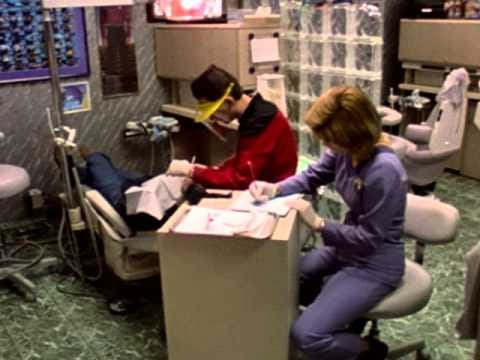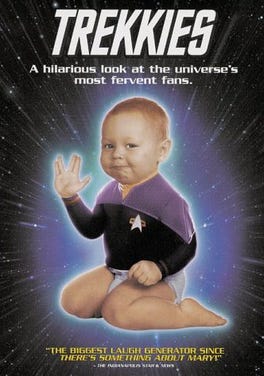This semester, I’m teaching a class on documentary films. Late in the course, I assigned the 1997 film Trekkies, directed by Roger Nygard. Former Next Generation star Denise Crosby travels the world interviewing fans and stars from the franchise, and her interactions with folks behind and in front of the camera are engaging and hilarious. I thought that, at the end of a semester, when students are tiring, let’s watch something fun.
And trust me, the film is still wildly fun. The film is 25 years old now and still packs an entertaining punch. Plus, surprisingly, it’s still emotionally moving as well.
My favorite moment remains that in which the dentist and his wife (who transformed their dental practice into a Trek theme park) tell Denise Crosby that they role play her character (Tasha Yar) in the bedroom sometimes (with the husband taking on the role — he’s taller). Crosby’s face when told this is priceless. Exactly what IS the appropriate reaction to such information?
Beautiful Weirdos
My overall thoughts on the film haven’t changed much in the 25 years since its release. It succeeds by deftly balancing two conflicting impulses. First, to be perfectly blunt, most people will tune in to make fun of the weirdos, and the film provides plenty of fodder for gawking. But the filmmakers also understand that a tangibly beautiful force binds the Star Trek fandom together: a community of acceptance.
Trekkies vacillates at a frenetic pace between these two impulses. Bouncing between parody and inspiration, Nygard and Crosby maintain their stability on a razor thin balance beam, and the film doesn’t fall into crass meanness, and if it does, it doesn’t linger there too long.
In short, the movie makes fun of Star Trek nerds, but mostly because it loves them very much and it understands the specialness of their community.
Trekkies as Prophecy
However, something else struck me watching it this time, a quarter century removed from its initial release.
When Trekkies was made, “geek culture” or “convention culture” or whatever you want to call it was still an untamed weirdness confined to the margins of society. Yes, Trek conventions were big, but they weren’t for everyone.
Remember, this was before the MCU devoured the world. Heck, Blade hadn’t even been released yet. The San Diego Comic Con, now the spring board for all the most popular entertainment franchises on the planet, was still about…well… comic books. Now San Diego is a NASA launching pad for corporate IP, the mega-budget cineplex fillers that have leaped from those pages to fill Disney’s endless content demands.
In fact, the term “nerd” seems quite watered down now, doesn’t it? Are you really a nerd by being a fan of the thing that literally everyone is a fan of because it has colonized our entire culture? Any jock or other popular kid at school can wear his Captain America t-shirt to school now and face literally no social consequences.
Imagine being Gabriel Köerner, the 15-year old Trek fanatic from Trekkies and showing up wearing the uniform you designed for your Star Trek club’s fan-film project. There was a real honor in being a nerd in the way Gabriel was. Much less so today. Most of today’s “nerds” are unimaginative conformists by contrast.
On one hand, you might look at the broad acceptance of niche fandoms by society-at-large as a good thing. A kind of progress, even. And yes, a devoted fan can move around in public un-harassed for the most part. And the market has responded to the massive popularity of such franchises by producing incredible amounts of “content” for fans to consume. There are definitely positive developments.
But I can’t help but think about the darker consequences of opening the doors of Comic Con to everyone.
When the Trek conventions were for die-hards, they were a haven (perhaps the only one) for the truly weird ones in our society. The odd kids could hang with slightly less odd kids. The cons functioned a bit like “The Losers Club” in Stephen King’s It. They were like the Barrens of Derry, Maine, a place of refuge from the hostile town they lived in. What happens when Derry gentrifies the Barrens? Where does The Losers Club go then?
As we’ve seen in the last couple of decades, this opening up of Geek Culture has frequently had nasty consequences. Gamergate is the most famous example of this. Marginal spaces in society that accept the outcasts, become, in their own ironic way, exclusive. And this can turn the oppressed into the oppressor. The sexism and bullying and intimidation that the Gamergate monsters unloaded on women in the subculture of video gaming is a notable, particularly dark example.
When robbed of their exclusive spaces of shelter, many of the “types” who would have ended up at these kinds of fan conventions, ended up online instead, in the chat rooms that would breed the Incel phenomenon among other wicked things.
Of course, I am not suggesting that all of the former geeks became monsters. The vast majority did not. Gabriel Köerner himself seems to have lived a happy and productive life as a Trekkie (or, as he might insist, a “Trekker”) among the normies. (Now that I think of it, the film makes a bit of a joke about the Trekkie/Trekker name controversy, but even the existence of such a debate shows the preexisting seeds of a power struggle about who gets to define the “true” nature of an in-group).
Still, Trekkies, enjoyable as ever, has gained a new significance for me in the last 25 years. It stands as a kind of marker in our cultural history, a before-and-after moment. And it gives us something to compare against a world under Disney’s command.





I’ll have to check this documentary out! Your thoughts reminded me of the Real Nerd Portlandia sketch. https://youtu.be/J9Jbz4c_WKA